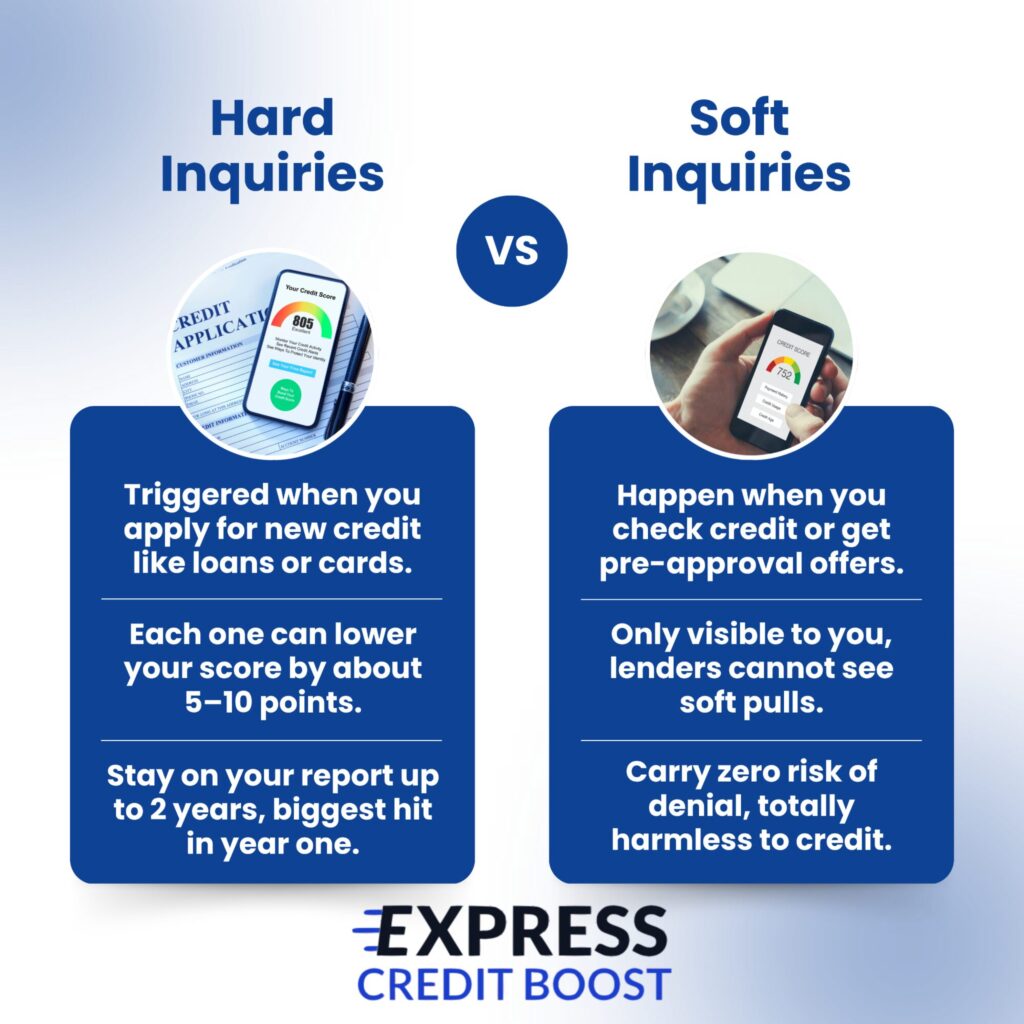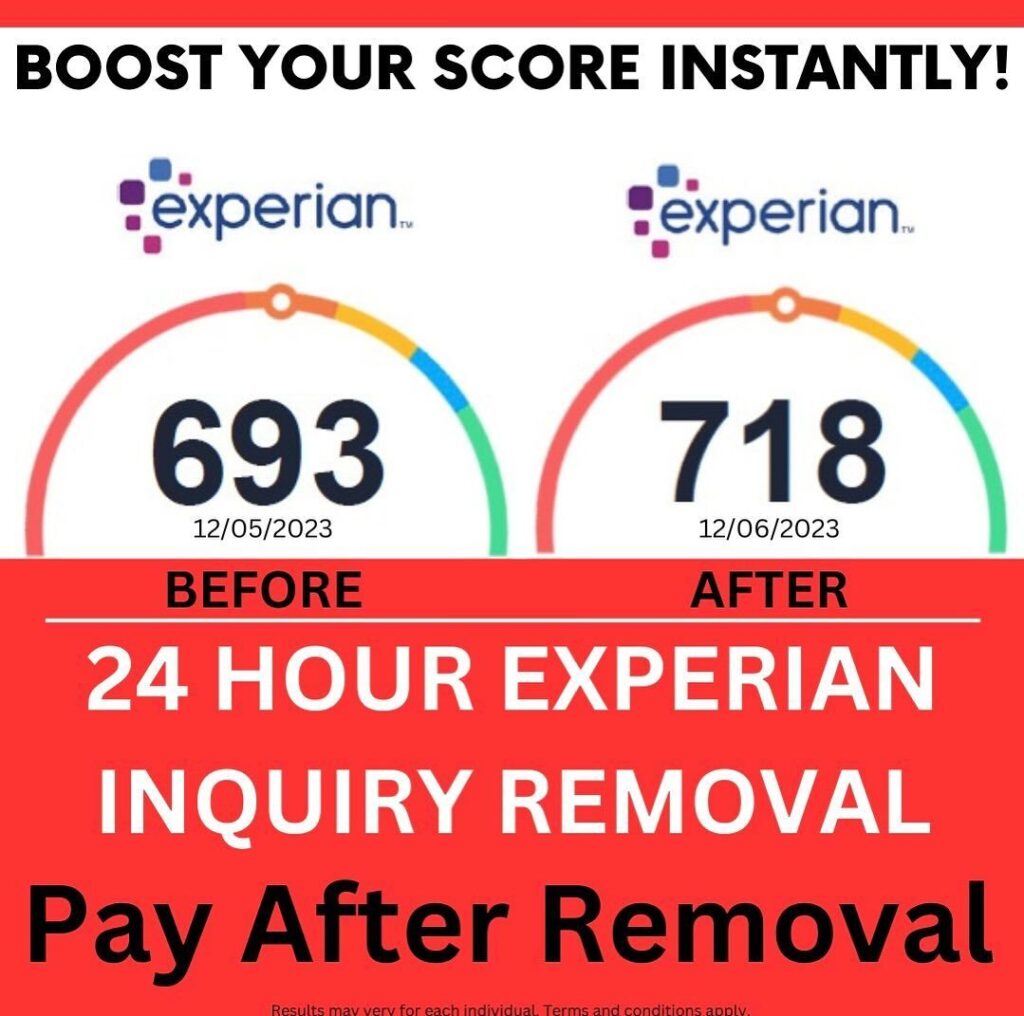A rental application can affect your credit only if the landlord’s screening system runs a hard inquiry. Soft checks don’t impact your score, but hard pulls can cause a small, temporary drop of 1–5 points.
Every rental application triggers a credit check, but not all checks are created equal. The key difference lies between soft and hard inquiries.
Soft inquiries, used for background or pre-approval purposes, don’t affect your credit at all.
Hard inquiries, on the other hand, signal that you’re applying for new credit and can temporarily lower your score. Here’s what matters most when renting:
- How it’s coded: Screening systems, not landlords, decide if the check is soft or hard.
- Timing: Multiple hard pulls in a short period may compound the impact.
- Authorization: Some inquiries happen by mistake or without full consent.
- Repair options: Unauthorized or misclassified inquiries can be disputed and removed.
Most rental checks are harmless, but understanding how they work keeps your credit safe and your rental journey smooth.
Protecting your credit during apartment hunting isn’t complicated, especially when you know how inquiries are triggered and how to respond if something looks off.
Keep reading to learn how to stay in control from your first application to move-in day.
What Really Happens When You Hit “Apply” for an Apartment

When you apply for an apartment, a lot more happens behind the scenes than most renters realize.
That one application can set off a chain of credit checks, third-party reviews, and data transfers between landlords and national credit bureaus.
Knowing what goes on helps you protect your credit before you hand over your information.
How Rental Applications Trigger Credit Checks
Most landlords don’t access your credit directly.
Instead, they use tenant screening platforms such as RentGrow, RentCafe, or Experian Connect.
These companies pull your file from one or more credit bureaus, Experian, Equifax, or TransUnion, and send the results back to the landlord.
The goal is to verify your payment reliability and debt levels before approving your lease.
Who Actually Runs the Check
The “credit pull” almost always comes from the screening vendor, not the landlord.
The vendor decides whether to run a soft or hard inquiry based on how the request is coded in their system.
That small technical detail determines whether your score changes or stays untouched.
Soft vs. Hard Inquiries

A soft inquiry is just a background review, it doesn’t affect your credit score.
A hard inquiry happens when you’re applying for a financial agreement like a lease or loan.
Hard pulls can drop your score by a few points and remain on your report for up to two years, though the impact usually fades within months.
Why Confusion Happens
Many leasing agents assume all rental checks are soft, but some systems default to hard pulls.
In a few cases, your credit file can even be matched using your name and address without your Social Security number, causing surprise inquiries to appear later.
Connecting the Process
From landlord to vendor to credit bureau, every application creates a small digital paper trail.
Most are harmless, but if the system flags a hard inquiry when it shouldn’t, your score can dip unexpectedly.
The next step is understanding when those inquiries start adding up, and how to keep them from chipping away at your credit score.
The Hidden Ways Rental Applications Can Chip Away at Your Credit Score

Once you understand how the rental application process works, the next question is how those credit checks can actually harm your score.
Most of the time, the impact is small, but even a few points can make a difference when you’re trying to qualify for a loan or new housing.
The key lies in how the inquiry is coded and how often it occurs.
When a Credit Check Becomes a Hard Inquiry
Whether a rental credit check affects your score depends on how the screening vendor codes it, not the landlord.
If the system classifies it as a hard inquiry, it signals that you’re seeking new credit, and your score can drop by one to five points.
If it’s coded as soft, your score stays the same.
The Stacking Effect
One inquiry may not matter much, but applying to several apartments at once can create multiple hard pulls.
Each bureau, Experian, Equifax, and TransUnion, may receive a separate request.
In a short time, your report can show several inquiries, which some scoring models interpret as financial stress or overextension.
Unauthorized or Misclassified Pulls
Occasionally, a background check is mistakenly processed as a hard pull.
In other cases, the system can match your credit file using only your name and address, even without your Social Security number.
These errors lead to inquiries you never intended to authorize.
When It Becomes a Repair Issue
Legitimate hard inquiries can’t be removed, but unauthorized or misclassified ones can. That’s where credit dispute services step in to verify consent and request deletion when necessary.
In short, small errors in how your rental credit check is processed can quietly erode your score. Knowing which inquiries are valid, and which are not, is the first step toward protecting it.
How to Keep Your Rental Hunt from Hurting Your Credit

A few smart moves can make the difference between a smooth rental search and a credit score that takes unnecessary hits.
While you can’t avoid every inquiry, you can control how and when they happen, and that’s often enough to keep your score steady.
Ask Before You Apply
Before submitting an application, always confirm whether the credit check will be a soft or hard inquiry. Get the answer in writing whenever possible.
If a leasing office isn’t sure, assume it’s a hard pull and proceed cautiously.
Cluster Applications Smartly
If you need to apply to several apartments, submit all applications within a short time frame, ideally within 14 to 45 days.
Credit models like FICO may group multiple inquiries in that window as a single event, minimizing the overall impact.
Bring Your Own Credit Report
Some landlords will accept a recent copy of your credit report, especially if it’s dated within the last 30 days.
This avoids duplicate checks and keeps your bureau data clean.
Turn Rent Payments into Credit Builders
Using a rent-reporting service can turn your on-time rent payments into a positive credit factor. It’s one of the simplest ways to offset the small drops caused by inquiries.
When and How to Dispute
If you spot an inquiry you never approved, dispute it immediately with the credit bureau.
Firms like Express Credit Boost specialize in verifying authorization and can remove certain Experian inquiries in as little as 24 hours.
In short, a mindful rental strategy protects both your home search and your financial reputation, helping you move forward without sacrificing your credit strength.
Turning Credit Anxiety into Confidence
It’s easy to feel nervous when every apartment application seems to leave a mark on your credit, but most rental inquiries are minor and temporary.
A small dip of two to five points rarely affects your approval chances, and legitimate inquiries fade from scoring impact within a few months.
The real key is catching mistakes early, unauthorized or misclassified pulls can be fixed faster than most people realize.
Express Credit Boost has helped renters recover instantly from these errors through its 24-hour Experian inquiry removal service, often clearing a client’s record before their next lease was approved.
By staying alert, disputing quickly, and keeping a healthy balance of credit activity, you can move forward with confidence instead of anxiety.
Ready to clean up your Experian inquiries before your next rental or SBA loan? Start today with Express Credit Boost and protect your credit before it costs you opportunities.







